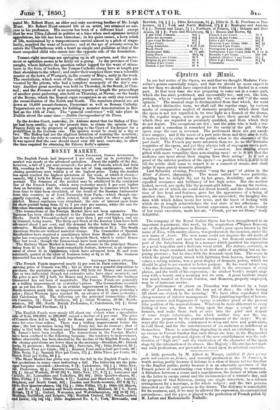The Company of the Royal Italian Opera has been strengthened
in an important department, this week, by the acquisition or'Signor Ronconi, one of the finest performers in Europe. Verdi's poor opera known by the name of Nino, with sundry aliases, was produced on the occasion, under the new name of Anato. The new name could not disguise the old faults of an absurd libretto and most barren music ; but Ronconi sustained the part of the Babylonian King in a manner which justified his reputation as a great tragedian and a first-rate vocal artist His stature, certainly, is below the tragic standard, and he is at first sight of anything but an im- posing presence ; but he rises with the demands upon him. The scene in which the proud tyrant, struck with lightning from heaven, instantly be- comes a raving maniac, was a great display of dramatic power, which we should be glad to see exerted to better purpose. By his vocal talents too, -his fine declamation, his consummate skill in the utterance of every phrase, and the truth of his expression,—he clothed Verdi's insipid sing- song with a beauty and a meaning not its own. A great baritone singer was much wanted at Covent Garden, and Ronconi, properly employed, may be of immense service.
The performance of Anato on Thursday was followed by a large slice of Lucrezia Borgia, and the last act of Zora ; the whole lasting till about one o'clock in the morning ! We have often reprobated this cheap resource of inferior management. This jumbling together of hetero- geneous scenes and fragments of operas is another proof of the present false position of the musical drama. What can be more abhorrent to every feeling of true art, than to bring upon the stage a couple of per- formers, and make them rush at once into the grief and despair of some tragic catastrophe, for which neither they nor the au- dience are prepared by the gradual development of the story ? We al- ways pity the poor actors, condemned to weep and rave and gesticulate, in cold blood, and for the entertainment of an audience as indifferent as themselves. There is something degrading in such an exhibition. It is no excuse to Covent Garden that such things are done in the Haymarket also. One of the professed objects of the new establishment was the cul- tivation of "high art," and the vindication of the character of the opera stage by the reformation of its abuses. Her Majesty's Theatre has not made any such professions, nor pretended to stand upon its artistieal ensemble.


























 Previous page
Previous page